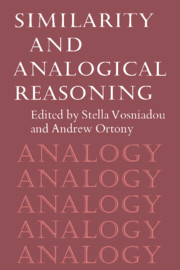Book contents
- Frontmatter
- Contents
- Preface
- List of contributors
- Similarity and analogical reasoning: a synthesis
- Part I Similarity and the structure of concepts
- Part II Analogical reasoning
- Part III Similarity and analogy in development, learning, and instruction
- Afterword: Comments on Parts I, II, and III: A framework for a theory of comparison and mapping
- Name index
- Subject index
Part II - Analogical reasoning
Published online by Cambridge University Press: 22 October 2009
- Frontmatter
- Contents
- Preface
- List of contributors
- Similarity and analogical reasoning: a synthesis
- Part I Similarity and the structure of concepts
- Part II Analogical reasoning
- Part III Similarity and analogy in development, learning, and instruction
- Afterword: Comments on Parts I, II, and III: A framework for a theory of comparison and mapping
- Name index
- Subject index
Summary
The contributions included in Part II focus on the psychological processes involved in analogical reasoning and discuss how and whether these processes can be captured in computer models. In her chapter, Dedre Gentner outlines a structure-mapping theory of analogy and discusses how this theory can be extended to model other subprocesses in analogical reasoning. John Anderson and Ross Thompson describe a mechanism for doing analogy in problem solving within a production system architecture, and Keith Holyoak and Paul Thagard describe a model of analogical problem solving embedded within a larger computational program of problem solving called PI (for “processes of induction”). In his contribution, David Rumelhart discusses how analogical reasoning might be handled within a parallel distributed processing system. Finally, Philip Johnson-Laird argues that current psychological theories of analogy have underestimated the complexity of analogical phenomena and raises the possibility that profoundly original analogies may depend on classes of algorithms that are not computationally tractable.
There are two discussions of the contributions in Part II. Stephen Palmer offers a critique of the papers by Gentner, Holyoak and Thagard, and Rumelhart, in the context of the Palmer and Kimchi metatheoretical framework for levels of description within informationprocessing psychologv. Gerald Dejong's commentary takes an artificial intelligence perspective, and therefore also includes some reactions to the chapter by Ryszard Michalski in Part I.
- Type
- Chapter
- Information
- Similarity and Analogical Reasoning , pp. 197 - 198Publisher: Cambridge University PressPrint publication year: 1989
- 1
- Cited by



